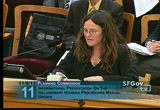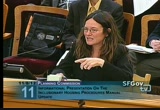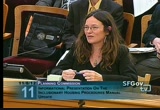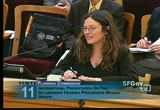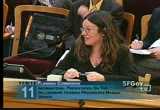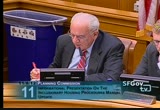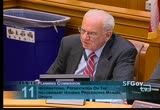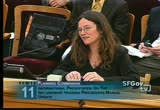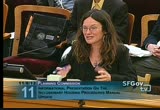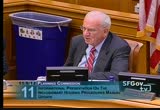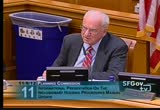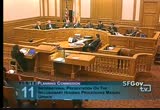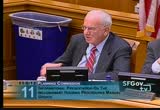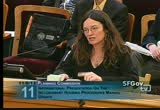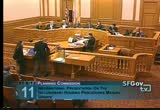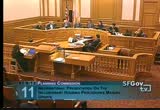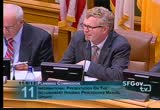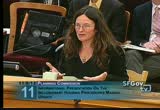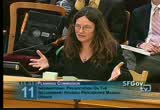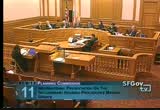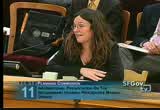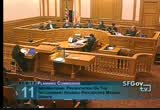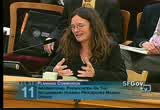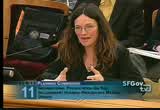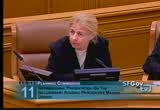tv [untitled] November 9, 2012 9:00pm-9:30pm PST
9:00 pm
ready than more that are not. but yeah, i think the preferences work. >> and i guess -- i mean, it would be -- obviously you don't have it with you today, but it would be interesting if we could see the data based upon the people who are habiting those units. >> i can tell you a little. the rental [speaker not understood] is much more reflective of san francisco. white, asian, latino and african-american. i would say not in exact equal proportions, but closer than the ownership program. which has about 320 units, is the rental programs. ownership program has more units tend to be mostly white and asian and we're concerned about that. and that's one of the reasons why we have tried to beef up our program in terms of requiring for some home buyer education, creating -- now we'd like to have the conditional use authorization and the pricing and we'd like to bring in down payment assistance. we have money from the state
9:01 pm
that will soon be gone. we always try to layer. we work closely with our lenders. we only work with approved lenders that come to our office for training. we give them a list of every single financial layering they should look into from their buyer, everything from the state, everything from the city, everything. if you're a teacher you should get this, if you're a police officer you should get this. we're doing the best we can to reach out. there is more we can do more than we're doing because it is not as diverse. the income levels tend to be not at the top. they're 10% below whatever the maximum is for the unit. people are able to bring in down payment assistance and still qualify for our program. that's usually when we more down payment assistance available. so, we're always hoping we can have more or a dedicated source. i think that makes a big difference. our pricing mechanism assumes someone is bringing in 10% down, which is typical in the
9:02 pm
regular market, but bringing in $35,000 from someone who is making, you know, $82,000 a year, the household is three, for instance, something like that, that's a lot of money to save over time. the more we can assist them in bringing that money partially -- they do have to make a 5% down payment of their own funds. >> careers, do we know what the professions ashe >> oh, yeah. i don't know exactly, we haven't really broken that down. i know from looking at all the occupations because it's so interesting that we have a lot of hotel workers. we have a good number of teachers. but, yeah, the hotel worker thing seems to be larger than you would imagine. >> it's reassuring. >> i feel like there are modest households in our units that are really, you know, that are finding a place to live for their kids and themselves. it's working. >> and i guess the other question i have, i know there
9:03 pm
is a limited appreciation, right? >> yes. >> i'd like to understand a little bit about what that is and, number two, what happens usually to these families or people who inhabit these units, if they decide to turn them over, do they usually move into market rate units, do they still live in san francisco? i know you may not have that date a but it would be interesting to know. >> it is interesting to know. so, in terms of profit on the units, people who buy below market rate ownership units aren't guaranteed any profit. that said, long-term owners tend to see appreciation on their units. but we try to make it really clear from the day this new theme started years ag we didn't want anyone to be misled and thinking they would be getting profits. it's in our literature. i'm sure it turns people off. we don't guarantee you'll make anything off your unit. we will let you sell it for what you bought it for. if it reprices below what you brought it for, which won't
9:04 pm
happen under our current mechanism. some people are able to secure a 20% profit and whatnot, which is fairly healthy, particularly sometimes for the time they've been in the unit. our current pricing mechanism is sound. so, people aren't walking away with more than they should or less than they should. and then in terms of where they go, you know, we don't do a good job so far of following up with people, but we want to. it's on our list. we talk to people and i talk to people just from living here, my partner is a high school teacher. i asked about three people who owned the bmr units. and just in his school, among them, you know, two moved on to market rate unit in the excelsior ingleside area which is probably second or third most affordable areas in the city. and one is renting now and getting ready to buy again. but will not be buying a below market rate unit. my sense from people is they're moving up. >> finally, i guess, what percentage of the units would you say turn over in a given
9:05 pm
year? are they pretty stable? >> 10 to 20. >> okay. >> that's a lot. >> thank you. i just wanted -- kind of a snapshot. when you give us a lot of information -- [multiple voices] >> we're not familiar with all the challenges. so, thank you. >> commissioner antonini. >> thank you for a very interesting report. i have a few questions. i would assume you talked about striving for ethnic balance, but, of course, you have to follow fair housing laws as far as equal application for anybody who comes in. then the other thing you mentioned, it's okay if you work here, but you're a resident somewhere else, you would qualify for this program. and the converse would be true, if someone lives here presently, but they work somewhere else? >> anyone can qualify for the program, but there is a lottery preference for people who live or work in san francisco and that's equal, live or work. the highest one is if you're a certificate of preference holder and you were displaced in urban renewal. which really does not crowd out
9:06 pm
the units. [speaker not understood] why would i apply because if there's a group of people who have the highest preference. but just like every other buyer or renter they have to qualify for the unit or whatnot, and they don't like the unit. the second preference is living or working in san francisco. yes, they're equal, and you're correct. >> i knew this policy of certificate of preference from urban renewal, seems like that was a long time ago. seems like most of the people would have already relocated. it may not be a very large percentage that takes advantage of this claim. >> i understand there are about 700 active certificate of preference holders who are getting mailings every time we announce a new housing opportunity. >> but i'm not sure that many of them actually activate that. >> they very well may own, you know, their own home. >> because it's a considerable period of time and you probably have the statistics. it's nice if that offer goes out and euro belieed to do it i think it's a good policy.
9:07 pm
i'm certainly someone who is now lives elsewhere and work in san francisco. [speaker not understood]. the other is fine, too. then i have questions and this is kind of basic -- you probably answered this during the early part of your presentation. i should know this already. but if you're looking at an ownership unit, you can earn up to 120th percentile. i'm not sure what the line is. * >> it's 90% of median income for our units right now. we have units that are reselling at 120% of median income, but the current program for new units is 90% of median income on average. and i can explain why it's 90 if that sounds like -- >> yeah, i remember when we went through these discussions over the last 10 years. it was always the 60th percentile for renters, the 100th percentile for homeownership. i heard recently they were trying to move it up to the
9:08 pm
120th percentile, with the idea there being a range. so, not all of them were at the 120th percentile but you had to have a balance between 80, 90, 100. so, i'm not sure why it's at the 90. >> so, the reason why it's 90, in 2006 the board of supervisors changed the income table that we use and wanted to move toward a san francisco-only table. they felt that -- so, the income table we used for most housing programs is based on marin, san mateo and san francisco. they felt like marin and san mateo were bringing incomes up. so, they wanted to see what san franciscans were making, they found san franciscans were making 10% less than the two other areas. for a long time we had two tables, three county table and one county table and we thought it was not working. we realized it was 10% less and moved it to one table and lower ed it to 90%. 100% median income for san francisco only. >> so, the median income is the
9:09 pm
three-county median but it's 90th percentile for that? >> yes, for that. the ordinance, the planning code allows the bmr units to be sold at 90% on average. so, in one building you could have 0, 0, and 110 units. >> that was what i was talking to you about. and the other question i have is ted you qualify for this, you have to qualify by income. and as you own the unit, your income increase, but doesn't mean you can't stay in the unit. >> that's correct. >> once it's bought. >> that's correct. we monitor for occupancy. [speaker not understood]. we don't monitor for income on an ownership unit, but we do for rental. >> it's good people do increase their incomes over time and someone we expertctiontion they would. -- expect they would. [speaker not understood]. it could increase quite a bit.
9:10 pm
but maybe they'd sell it and move into something that was a little more -- know, because they could afford a market rate unit then. >> that's interesting, i agree. a lot of those households are smaller households that buy one-bedroom units. they often find themselves being sized out because they get married and have kids. they tend to be moving on. >> that makes sense. and then i think you talked about shared equity. there is a balance between the sale price and the selling price and the city gets some of the equity and the seller gets some of it; ; is that correct? >> actually our down payment assistance program has shared equity. market rate doesn't. any profits go to the bmr owner who sells. >> okay. >> our [speaker not understood] programs do, you're correct. >> there is not shared equity in that. and how about repairs? i assume it's up to them to pay for the repairs. let's assume, you know, their improvements can be elective, but sometimes something happens
9:11 pm
within the unit. plumbing, leal, all kinds of possible things that could break. it's up to the owner to pay for it like any other -- >> it is. >> it's basically theirs? >> it's their unit. it just has restrictions on it in terms of to whom they can sell it and the refinancing of it. they can refinance it, but it has to be a better loan. who could they leave it to, they have to live in it. the main restrictions affect people and they're market rate. >> and their sales have to be restricted to the income growth as well. mainly, they have to sell to someone and they're allowed a higher amount i believe you said. >> yes, it tends to be higher especially if they were long term. >> that sounds pretty reasonable. and then on the rentals, you talked a little bit about when rental converts to ownership, it would be sold at the level of rent they're paying. it seems that's a little strange because the thing is worth a certain amount.
9:12 pm
even using your can calculations because you're already down pricing it to fit into the category as it is. if the unit would normally be $600,000, you're probably selling it for 200,000. i'm just throwing out some numbers, but, you know, that may be an exaggeration. but let's say 500,000 or 250, perhaps. is it thectionv there a way to still price it at what would be the right price and they could continue work out some kind of financing structure work there? payments would be aloe questionvthctionv don't what they're paying in rents or close it it, but it would be spread out over a longer period of time so their sale price ends up being more in keeping with what everyone else is getting the ownership unit for. >> should the unit go from receiptctional owner and priced at the ownership level, that would still be at the below market rate --
9:13 pm
[multiple voices] >> yes. >> i don't know. it's an interesting concept. we can review it. >> not being discriminatory, but someone is coming in to buy a unit under the ownership. and if there is one being converted, that person who is currently in there is not only getting the lower ownership rate, but they're getting even lower the rental rate and they're buying something for very deeply discounted price. >> yes. you know, we did add, we are going to clarify for the procedures manual that comes back to you, but it's in the ordinance conforming amendment. if you're -- and you're that renter and you're not at 55% ami any more, first we're going to let you go to 200% of the original. so, you were allowed to go up a little. we're going to price it at your exact income level. >> that's the other point. it's not like what it was when you got it. it's what the reality is. [multiple voices] that tends to make a lot of sense to me. it sounds like you're doing a lot in this program. and i hear it sounds like it's
9:14 pm
pretty successful and i hope it's able to continue on. and there are some changes that are going to take place as per the measure that just passed in the legislation where the percentage for on-site will be a little lower, but na has nothing to do with this. you'll just have to follow the new laws and who it applies to in terms of number of units. thank you. >> you're welcome. i think my coworker wanted to make a comment. >> there are a couple questions about resale and equity that's occurred. i want to be clear the resale is to sell to a buyer who qualifies -- who income qualifies. it's not -- they're not selling on the open market, but to income qualify. >> i understand that. that would limit the amount of appreciation. assumedly over a period of time, there is going to be
9:15 pm
appreciation in the ami rate and everything else. >> yes. >> if they're there five to ten years, there would probably be built-in appreciation. there money should get return on it like tied up in a house. they should get something for that period of time. >> yes. and they've been paying down their loan. >> thank you. >> commissioner hillis. >> thank you for the presentation. helpful to understand. [speaker not understood] we don't get a sense of how it's operated after. in some of the data you gave, just globally about the program, i think it is helpful when you come back on the 29th to have that as part of the packet, like how many percentages -- you may not be here. >> i will not be here, no. >> the percentage of projects that's -- how many on-site and off-site, if you do have demographic information -- >> can i do that today? >> you gave a lot of that information. it would be good publicly to have it, too.
9:16 pm
>> okay. >> yeah, we don't have to spend a ton of time. >> i can tell you, i can show you. >> sure. >> okay. so, you can see this. you might not be able to. the first box just shows rental versus ownership. this is through 2011 and it starts in fiscal year 2002 because we wanted to look at the year where the fee started. the revenue fee before 2002. so, it doesn't add up to how many units i say there are in total. between fiscal year 2003 and fiscal year 10-11, we completed 143 projects and you'll see that 79% of those projects show on-site. 4% shows off-site. and 17% shows the fee. and then if you translate that into units, 59% of the units
9:17 pm
are on-site, 26% of the units are off-site. there's a really big -- one really big off the project, has 170 bmr units. and 60% paid their fee, okay. so, the on-site option is the most popular. >> does the city have a preference? do we rather because the percentages get higher units off-site, [speaker not understood]? >> i don't have it [speaker not understood]. >> and then a follow-up on commissioner borden's question, i still don't think i understand like the lottery process. when a lottery is used. walk us through quickly. i built some units, i'm a developer. i have three bmr units, i'm ready to go. what happens? >> you get your units priced, fill the form out and i send you pricing for your units and this is what your maximum prices are. you submit a marketing plan and that marketing plan says you have to publicize your units
9:18 pm
for a 28-day period which is moving to 45 for ownership, 28 for rental. and that means we post it on our website, we send out an e-mail alert to 10,000 people that have signed up through the city. the developer, the sponsor publishes in five local venues, can be craig's list, local papers, that hits a demographic group in save. and they have to do a weekend paper over two weekends. we'll have info sessions if there are two or more units. we leave most of it. we show up and talk about the program. it's mostly questions about how to qualify. they talk about the units. and then they're collecting applications throughout that process themselves and there are application we provide. and we make it clear what it's for, what project. and at the end of that they fill out a list saying this is everyone who applied and they transmit back to us. two days later we hold a lottery. if it's really big we'll hold it at the public library, for instance. everyone who applied and submitted a complete
9:19 pm
application got a lottery ticket like a fair ticket, carnival ticket. and we -- the sponsor kept the ticket and copies it, staples it to the application, a number of things to make sure it's all sound. they get put in three different buckets, [speaker not understood], we lotto people through those preferences and create a list that is at least -- we take at least 10 people for every unit if there are that many. and then we've got our final ranked lottery list. we take it back and rank it. those individuals are contacted one by one to see if they're interested, given time period to get a loan and whatnot. >> so, the developer takes the first person on the lottery list and if they can buy the unit -- if they qualify, they get the unit? >> normally they can because we have the loan pre-approval [speaker not understood] education. >> that's great. and then some of these changes, questions on what the rules are
9:20 pm
now, the one where you can adjust the ami if it doesn't sell, what happens now. well, the ordinance is currently silent on that. so, we -- so, we'd like it to be explicit that's allowed. >> you're doing that -- >> the procedures manual has been set since 1992, we can do it. so, they have a time on that. >> given how far can i go -- [multiple voices] >> okay, only 20% higher than the use restriction level. it's never higher. >> and then the rental program where you're allowing up to 200% [speaker not understood], what happens now? what's happened over the last couple years if someone buys those? >> during the last two years we haven't done a fantastic job of monitoring for jobs in our rental units. it's a much smaller program. it's no excuse, we had limited staff.
9:21 pm
the ownership, you can imagine in 2006 and '7 and '8, took us by storm. we had so many units. we had 350 i think units close in one year in 2007, i believe it was. so, this is a response to that. the rental program is obviously getting bigger and requires more attention. this is the attention we're giving it. >> and then you mentioned various financing assistance [speaker not understood]. how many units that are purchased also get some type of other assistance from the city? >> i think half. >> thank you. >> commissioner wu. >> thank you. it's great to see the program in such good hands. thank you for answering all these questions today. i just want to ask specifically about the rental to owner situation and just get a sense of how often has it happened? i know there weren't that many rental units before.
9:22 pm
maybe you're anticipating for the future. >> okay. it actually happened once, five years ago. and it was really explicit in that approval that they would sell at 100% of ami. that was absolutely there. and then we have two projects that are asking for it now. so, it's not happened, but for these three units in 2006. so, two projects that are also smaller that are coming in to convert, they have different situations and they're older approvals. and thea large projects coming online. 1407 market which has 90 rental units will be ready some time in the next year or so. 18th and mission will have 40 below market rate units. [speaker not understood] harrison, 49 units. 22 25 third, has 49 units. a lot of these projects have some other financing on them that is going to require that they rental for a good long
9:23 pm
period of time, 20 or 30 years. so, we know those -- we're trying to let our renters know that they can convert. >> great. i think that's very forward thinking. i know that relocation is very difficult. so, i'm really supportive of the way that you've laid it out and proposed it here today. so, overall, i think the more transparency, the more explicit helps everyone understand what they're up against when they're trying to get a unit. thank you. >> commissioner moore. >> thank you. will this market be complex, you become an expert. each time we talk about t i feel i need an expert. the more i listen to you, the less i feel i know about t. * let me ask you one question aside from congratulating you for this great piece of work. how does this compare to other cities? this looks to me incredibly forward looking and really right on target. are we better than others -- >> i don't know if we're better than others. people think of us as having the strongest inclusionary program in the country.
9:24 pm
they often say that. we call us, fly to washington state right now. they have to have san francisco, you know. to us, there is so much more we could do, so it's hard to think that. we don't have the strictest -- we have strict requirements. 15% on-site which we know will change, and 20% off-site in fees. it is fairly -- not strict, it's strong for the country, but a lot of other cities have the same requirements. and some of those requirements seem stronger, but they don't produce as much as we do. we were talking to cities recently trying to figure this out myself. you may have a threshold in another city in california, in your first unit you're paying a fee. we're already talking about doing on-site. we started at 5 and now potentially we go back to 10. currently we're at 5 units or more are subject to the program. but they don't produce much.
9:25 pm
for how much we have and how much we produce, i have a feeling we're producing more than most, even most large cities. >> let me just comment. i think it's really your due diligence and thoroughness including your transparency because the issues being discussed all the time. you are creating a level of public acceptance, which really kind of unique to the city and i think that's where success lies. * which is you're not bringing in people pulling them by the hair to the table as an obligation. it is something that needs to be done as part of the standard of discussion. part of the strength of where this comes from [speaker not understood]. thank you. >> i want to thank you. this is obviously a lot of use of information you have internally and institutionally, to spit it back out in half an hour or so is a challenge. i think the other item today was very heavy intensive, i want to thank commissioner borden and all of us getting in that mode where we're getting
9:26 pm
in the judgment, seeing a picture of a project like this. if we can draw a little bit of parallels and maybe in the future take some hard data of your program and overlay it or somebody ends up overlaying it, it gives us a little more definitive how are we doing, how do we rank. i suspect very well by how your eyes lit up when we asked the questions and you had the answers we're doing very well. apples to apples might make it more interesting. thank you for your effort. >> thank you. >> sugaya. >> yes, along that line it might be interesting -- i'd be interested to know the cost of the program. * commissioner sugaya within the city there is a cost obviously with staffing and administration. i'm not looking for a number, but some kind of ratio or
9:27 pm
percent or something that tells us what the program is costing. >> i'm glad you brought that up. we are just completing a financial analysis of the program that we are going to do every five years. so, that will give you some idea of the cost to the sponsors of what's happening. it looks at fee on-site and off-site side by side. comparatively how it impacts them. they can get you information regarding staff [speaker not understood]. >> with respect to the development community, since the program has been running for a while now, do you feel that there's general developer acceptance or -- do you know what i'm trying to say? i'm sure some don't like it, for example, and they're sort of only doing it because they're forced into it, where others i think that have come before us are more accepting and somewhat enthusiastic at times and are perfectly willing to have on-site and that kind of thing.
9:28 pm
>> i feel like there's always been a diplomatic relationship between our office and the planning department and developers when it comes to this program. i've always been impressed by ti know that some, you know, some groups of developers may have felt that their voice wasn't heard as much, particularly maybe the rba in the last financial analysis we did of the program five years ago. but i think we've gone a long way of bringing them in and listening to their concerns. for instance, some of those things that are not covered in the manual that we know are important that are listed in your memo come from them. so, i think we feel like we've reached out from the small to the tall for this review and i feel that most people feel we've asked for their voice, especially the financial analysis that we recently have been bringing people together and talking to developers about the land dedication issue. i'm sure they'll have their own concerns. because the program is growing and people are learning it more and people are talking to each other more. so, we'll hear from some of
9:29 pm
them when we come back for approval. >> thank you. >> commissioner moore. >> keeping you for a second day. i was listening to a replay of the 2010 planning commission meeting. it was rba saying -- he was actually commenting on exactly what you're saying. he said the more transparent the department is -- and he's speaking about planning as well as you -- the easier it is for us to work with obligations which we don't have any problem with as long as they are clear from the get go. i would really -- aloe senly he kaz commenting, you were speaking to it. * essentially he was commenting for you to bring a program forward which includes the general public is more accepted. when you build here, that's part of the deal. >> thank you. >> commissioner antonini. >> yeah, one final question from me. and although the preach has a lot of benefits, there are alwaysos
116 Views
IN COLLECTIONS
SFGTV: San Francisco Government Television Television Archive
Television Archive  Television Archive News Search Service
Television Archive News Search Service 
Uploaded by TV Archive on

 Live Music Archive
Live Music Archive Librivox Free Audio
Librivox Free Audio Metropolitan Museum
Metropolitan Museum Cleveland Museum of Art
Cleveland Museum of Art Internet Arcade
Internet Arcade Console Living Room
Console Living Room Books to Borrow
Books to Borrow Open Library
Open Library TV News
TV News Understanding 9/11
Understanding 9/11